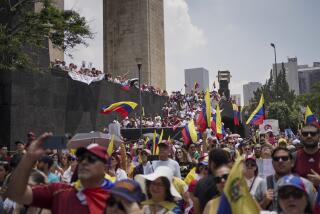Fear factor could tip Venezuelan election, analysts say
- Share via
CARACAS, Venezuela — In choosing between incumbent Hugo Chavez and challenger Henrique Capriles in Sunday’s presidential election, Venezuelans will weigh differing policies, sharply contrasting personal styles and a consideration that observers say may tip the balance among voters: the fear factor.
For Capriles to win, many voters who lean in his direction will have to overcome fear that they will lose their jobs or benefits in the event of a government change, that there will be an increase in political violence if Chavez loses, or that the government somehow will find out they voted for Capriles and take retribution.
These were the findings of a recent independent poll, whose author spoke to The Times on condition that his firm not be named because Venezuelan law prohibits the citing of opinion surveys in the week before the election.
The fear factor could be decisive because some polls indicate that 20% or more of voters sampled are undecided, are afraid to express their preference or don’t intend to vote.
“The fear factor exists and, if many people abstain from voting because of it, minority support for Chavez could turn into a majority,” the pollster said.
Most polls, but not all, give the edge to Chavez, with Capriles gaining ground. Most analysts agree that Capriles poses the greatest electoral challenge to the incumbent in his 13 years in power, and that Capriles has closed the gap in the campaign’s home stretch.
“According to the polls we follow, all the momentum is with Capriles,” said Alejandro Grisanti, Barclay Bank’s director of Latin America investment research. “In fact, we issued a report this morning saying Capriles will win.”
But voter anxiety could skew the results. Chavez has warned of civil war if he loses. On Friday, a newspaper quoted a leader of the Tupac Amaru Revolutionary Movement, an activist Chavista faction, saying his group would defend a Chavez victory “with lead.”
“We are prepared and well armed.”
The fear factor helps explain the rapid decline in recent weeks of the Venezuelan currency, the bolivar, in black-market trading to as much as 12 to the dollar, or nearly three times the official rate. The weakening indicates that many are seeking “safe haven” dollars as a hedge against uncertainty, said Jose Manuel Puente, an economist at the IESA think tank in Caracas.
According to the independent poll, nearly half of Venezuelans questioned believe that political violence is likely in coming months, especially if Chavez loses, because they think that he won’t cede power peacefully. A smaller percentage believes that they will lose their jobs and social welfare benefits if Capriles takes office.
Moreover, half of those polled think the national electoral commission that supervises all voting, known by its Spanish abbreviation, CNE, safeguards Chavez’s interests. That could explain why one-third of Venezuelans don’t believe their vote is secret.
Enrique Marquez, one of three Capriles campaign officials who serve as delegates to the CNE, said the opposition has made 110 complaints before the commission for alleged abuses of election laws by Chavez, but it has not been able to make a single case.
At a news conference Friday, top Capriles campaign managers said they were aware of the fear factor and were doing what they could to counteract it. To limit irregularities at the polls, the campaign is stationing at least two observers at each of the 40,000 balloting places across Venezuela on Sunday.
At all campaign stops in recent weeks, Capriles has told crowds that he has no intention of eliminating the Missions, as Chavez’s social welfare programs are called, that benefit an estimated 5 million poor Venezuelans, nor will he fire any of the 2.5 million public employees.
To be sure, voters will decide based on their allegiance to Chavez’s socialist “revolution” or their attraction to Capriles’ promises to reduce government waste and foreign giveaways.
But Capriles officials Friday complained of Chavez’s unfair advantage in getting his message across, in taking out foreign loans to fund campaign giveaways and in ordering public employees to attend campaign rallies.
They also said that since July 1, Chavez has used the national media for an average 40 minutes a day of public service messages, which mostly serve electoral purposes.
Meanwhile, Venezuelans were warned that election day could be a long one. The CNE said a tight race may mean that results will not be available until midnight Sunday.
Asked to comment on the high numbers of foreign news media in Venezuela to cover the election, Ramon Guillermo Aveledo, head of the Democratic Unity coalition of opposition parties, said it was not necessarily a good sign.
“When small countries like ours become interesting, sometimes it is for the wrong reasons,” Aveledo said.
Kraul and Mogollon are special correspondents.
More to Read
Sign up for Essential California
The most important California stories and recommendations in your inbox every morning.
You may occasionally receive promotional content from the Los Angeles Times.









